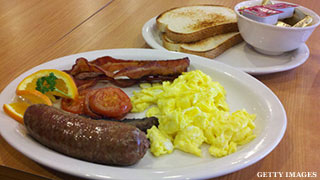
Let me apologize on behalf of an entire country full of fitness gurus, diet-book authors, trendy nutritionists, weight-loss clinics, unemployed actors working in gyms, and people who scream at chunky people on TV for a living. Almost all of us have been feeding you a line of bull. And we've been feeding it to you for breakfast.
Why is this so important to me? In my new book, The 8-Hour Diet, I'm proposing something that may sound a little radical: Skipping breakfast may be the key to skipping a lot of things -- excess weight, diabetes, Alzheimer's disease, and premature death, among them. How are you going to do all that, simply by pushing away from the breakfast buffet? By engaging an amazing process called "hormesis." Scientists tell us that if you challenge your body, the way you do with a 16-hour fast, it responds by preferentially burning fat, sharpening your mind, tuning up your heart, and turning on the human growth hormone jets. Cool, right?
Which leads me back to breakfast, and why it's important to skip it.

Of course, I'm a big believer in science. But sometimes science gets it wrong. Like back in the early 1990s, when we were told by the US government that we could eat whatever we wanted, as long as it was "low fat." So we all chowed down on bagels, bread, pasta and fat-free cookies. Except, that "fat-free" stuff wasn't free at all; by shocking our bodies with big doses of carbohydrates, the fat-free craze just increased our risk of obesity and diabetes. (Not to say that all carbs are "bad" -- make the right choices with our grocery guide to the Best Breads and Grains.)
Turns out, the same is true of the expert advice to eat a big, hearty breakfast. We've all seen the "facts": People who regularly skip breakfast are 450 percent more likely to be obese. People who go for a period without eating lose muscle, not fat. People who eat a big breakfast "jump-start" their metabolism and burn more calories.
Except it's simply not true.
Consider a study published in Nutrition Journal in 2011. Researchers followed the eating habits of 100 normal-weight and 280 obese participants during a two-week period. They found that in both groups, the more calories they ate at breakfast, the more total calories they ate for the rest of the day. And when they ate a smaller breakfast, or none at all, their total calorie intake was less.
Conclusion: Overweight people should "consider the reduction of breakfast calories as a simple option" to lose weight.
In fact, more and more research is proving that not avoiding calories in the morning is the way to stay not only slim, but also strong in both body and mind. In fact, this strategy can completely erase the damage of an otherwise "bad" diet.
In a 2010 study in the Journal of Physiology, researchers fed a group of active men an unhealthy diet composed of 50 percent fat and 30 percent more calories than they normally consumed. They then divided the men into three subgroups: One group didn't exercise at all, another group exercised four times a week after eating breakfast, and the third group exercised four times a week before eating their first meal of the day. The no-exercise group gained six pounds, developed insulin resistance, and began storing extra fat in their muscle cells. The group that exercised after eating breakfast gained about six pounds and also showed signs of insulin resistance and greater fat storage. But the participants who exercised before eating their first meal gained almost no weight and showed no signs of insulin resistance.
So why have we been lectured to about "the most important meal of the day" for all these years? "There are a lot of forces in our society pushing against" skipping breakfast, says Mark Mattson, PhD, chief of the Laboratory of Neurosciences at the National Institute on Aging. "Those forces are driven by money. They include the food industry obviously, and in some respects the pharmaceutical industry.” Breakfast cereals alone are an $11 billion a year industry, and that's before you get into eggs and bacon, bagels and lox, pancakes and syrup.
There are a lot of different businesses relying on your morning meal to make their budgets. So before we all go hog wild on bacon and do the chicken dance over eggs, let's take a second look at the research. The new book, The 8-Hour Diet, does just that -- and it will change everything about how you view breakfast.
And the good news: Skip breakfast, and you can set your alarm clock just a few minutes later! And more importantly, you can delay the rigors of aging and weight gain at the same time. Pick up your copy of The 8-Hour Diet to discover how controlling when you eat can help you lose 10, 20, 30 pounds or more.





